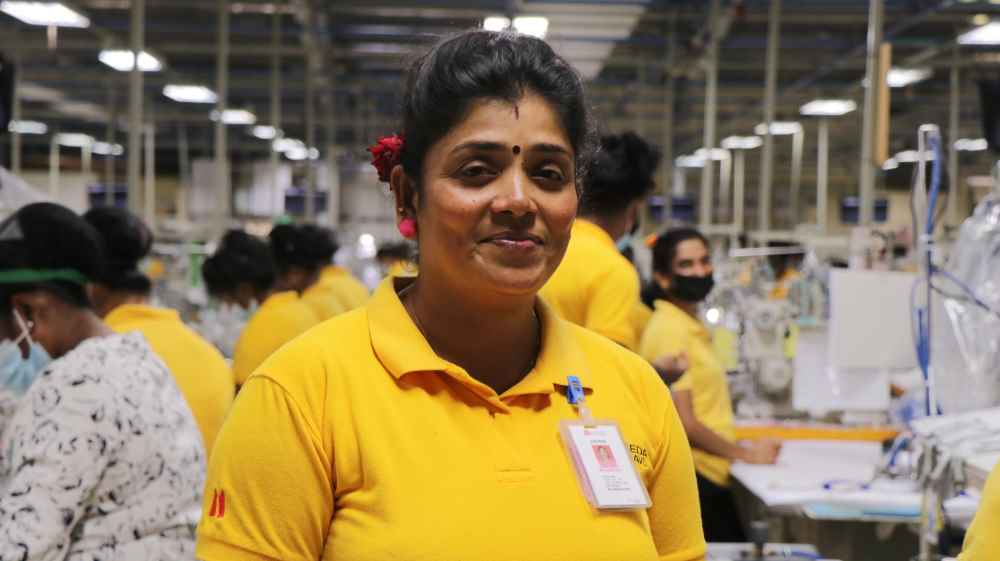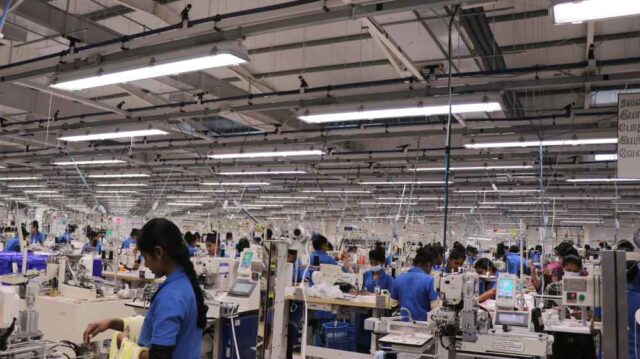
When the civil war in Sri Lanka ended in 2009, the apparel sector was one of the first industries to enter the Northern Province, hoping to infuse much-needed investment to rebuild the community. Over a decade later, the apparel industry remains the only large manufacturing sector that has ventured north to set up large-scale operations employing over 8000 individuals in the region.
Among them are Dianna, Durkadevi and Harshani, who have been dedicated employees with leading apparel manufacturing companies in the north for nearly a decade. They share their stories of dreams, personal growth, opportunities manifested and how employment through the apparel sector has placed within reach a future filled with possibilities.
Located over 340 kilometres from Sri Lanka’s capital city of Colombo – Kilinochchi and Vavuniya have been in the throes of a thirty-year civil war which ended in 2009. While this brought about post-war socio-economic challenges, an urgent need to rebuild the livelihoods of the community was imperative.
Recognising the role the sector plays in the development of the country, this paved the way for companies like MAS Kreeda Vaanavil, Omega Line Vavuniya and Hirdaramani Industries, who were among six companies to enter the Northern Province, to provide job opportunities in the war-torn region and infuse further investment into the economy.

It is no easy feat to set up operations in a rural location. It took at least three years until factories could open its doors. But its impact on employment and the communities have been immense. With over 80% of employees being women in these factories, the female labour force participation rate has steadily increased over the years. For a number of these women this was their first entry into formal employment. This saw the need to introduce programmes that uplift women and create further opportunities towards financial independence.
Creating a workspace that considers the well-being of its employees and environment has also been a critical factor for which the industry already had established a track record of moving factories out of congested Industrial zones to more remote locations. Manufacturing plants are set up on greenfield sites with an emphasis on sustainable operations and reducing the industry’s environmental footprint. From creating LEED or green building certified facilities, introducing renewable energy sources like biomass and solar energy, to responsible chemical use to attain zero toxic status in all products and processes, factories in the north have made a long journey to go beyond just compliance with regulatory frameworks and building sustainability into their core operations.
A large part of the exports of these companies are to the EU and qualify for the EU’s GSP+ scheme. The current scheme comes to an end in 2023 and Sri Lanka will need to reapply for the new scheme that comes into effect in 2024. Many companies in the north and east are dependent on GSP+ which is essential to their growth strategy, especially for the workforce which produces apparel primarily for European countries. These factories are a testament to the effectiveness of the scheme which have then benefitted these communities like no other industry.
Empowering women
With a name alluding to the ‘Rainbow’ usually attached with hope, MAS Kreeda Vaanavil currently employs over 2000 individuals in the Northern Province. Having opened its doors in 2012, the factory produces over eight million pieces annually for its primary market in Belgium,[1] with over 80% of its products exported under the GSP+ scheme.
Under the MAS 2025 Social Sustainability Strategy, “Empowering Women” was recognised as a standalone pillar, for which a number of initiatives including Women Go Beyond (WGB) have played an essential part to ensure career advancement and skills development.[2]
As part of the company’s journey in sustainable systematic change, empowering 100% of women on the factory floor, creating a world-class workplace and introducing meaningful employment have been an ethos for MAS Holdings.
This commitment was reflected on the factory floor, where women like Dianna, who has been working with the company for nearly ten years and hails from Jaffna, were provided growth opportunities for single mothers like herself. From a sewing operator to now a team leader heading seventy associates, her goal is to only move upward in life.
“My family’s, and my future would have been uncertain if factories like this did not exist in Kilinochchi. When I joined the industry, I did not know how to operate a sewing machine, but I was trained by my supervisors and given the opportunity to grow, even though I did not finish school. I joined the company during a critical time in my life when I didn’t even have a source of income. When I saw how the women were working here, I was inspired to know that I, too, could be financially independent. This is hope,” she says with a smile.
Cross-collaboration and learning opportunities
Travelling further south within the Northern Province is Omega Line, which commenced operations in Vavuniya in 2013. The company supports the livelihoods of over 2600, amongst whom over 88% are women. The apparel manufacturer produces over 34 million pieces annually under the GSP+ scheme[3].
The heart and soul of the company are women from the region which has enabled Omega Line to spearhead several female empowerment programmes, some of which provide growth opportunities for operator-level staff to enter management.
Under Calzedonia, its parent company in Italy, Omega Line gives its team the opportunity to experience cross-collaboration training in its headquarters in Verona, Italy, a unique initiative given to selected factory-level staff.
Residing close to the factory with her mother and sister is Durkadevi, one of the few female technicians at Omega Line. She looks forward to travelling to Italy to visit the parent company for further training. Her entrance to the apparel industry was one of self-reflection. She says that although she initially joined as an auditor, she shifted to the technical department as her management saw her capabilities in this area.
“When I stepped foot in the factory for the first time, I told myself this opportunity is for me. I came with hopes and dreams of one day being able to put food on the table without difficulty or purchase new clothes, which was something I could not afford to do earlier. But never did I think that I would get to travel overseas for training opportunities which would give me exposure to learn skills from countries like Italy,” she said proudly.
Promoting equal opportunity
Located a few minutes away from the Vavuniya Town, Hirdaramani Fashions (Pvt.) Limited commenced operations in 2012 and is also a company that gives prominence to women empowerment programmes. During the war, the abandoned building was once riddled with bullet-holes. Today, the building has been transformed into a state-of-the-art facility, housing over 1400 employees who produce over 2.5 million pieces a month. 80% of the products are exported to the EU under the GSP+ scheme.
With a largely female workforce, the ‘The Wonders of Wellbeing’ (WOW) programme is a holistic strategy that integrates wellbeing into the business agenda and culture. It’s based around five key pillars – mental, relational, physiological, economic, and environmental – and includes a wide range of tools and initiatives to achieve measurable impact.
From teaching tools to improving financial literacy among employees, to creating equal workplace opportunities, the company also appoints wellbeing champions to embed wellness into the organizational culture by advocating it daily at factory level.
Harshani Priyarathne, who has been with the factory since its inception as a recorder in the cutting department says companies like Hirdaramani has provided learning opportunities for her, even though she could not complete her Advanced Levels due to financial difficulties. Her husband too has been working at the factory for over two years as a store supervisor for which both have been given the opportunity to rise up the ladder and earn a stable income to look after their child.
“I always say the factory is like a campus, where you are allowed to learn various skills in apparel manufacturing compared to other industries,” Harshani stressed. “When I began at Hirdaramani Industries, there was only one building. I was sent to Colombo for training to learn Enterprise Resource Planning (ERP) to be implemented in the Vavuniya factory, where I also trained my colleagues. This was a great learning opportunity which gave me the confidence to build a career in the apparel sector.”
“I want to be a manager and I am currently doing a diploma in apparel management. I take pride in the work I do because the contribution of the apparel sector is immeasurable. I always say there are opportunities in the apparel sector for everyone, and it doesn’t matter if you are qualified or not.”
Though Dianna, Durgadevi and Harshani entered the apparel sector by chance, it paved the way for career growth and learning opportunities. Their stories are among hundreds in the Northern region where women are given financial freedom to support families and discover their potential. To unleash the true potential of the North for exemplary women like them, requires concerted efforts by the Government and relevant stakeholders. This means further strengthening relationships built with countries in the EU, and availing of the benefits of GSP+ to boost trade for the development of the community at large.



